- Home
- Barbara Metzger
My Lady Innkeeper Page 3
My Lady Innkeeper Read online
Page 3
Just in case anyone did venture out, Lyndell was prepared. Wearing the navy kerseymere—even more sacklike on her than Isabelle’s grey—and the rest of her disguise, she stationed herself in the small private parlour where she could see the front entrance and hear what went on in the tap room. Dust cloth in hand, she was ready to save her country, if not her reputation. What she wasn’t ready for, certainly, was Molly.
Coming into the parlour, snooping on her, most likely, Lyndell thought indignantly, Molly looked even more fallen by candlelight. She’d changed into a red satin-bodiced gown with lacings that didn’t, or couldn’t, do the job. Depending on the job, of course.
Lyndell had seen light-skirts before; one couldn’t help but be aware of certain women in the park or at the opera. Those were high fliers, though, elegant mistresses of the wealthy. She even knew some well-born widows, said to be “in keeping” as one would say “in mourning.” Straw damsel, fancy piece, the muslin company, no euphemism quite fit the overripe Molly so well as whore. But Molly was here, and Mrs. Bennett wasn’t, so Lyndell could just stop being so old-maidish—perhaps her own dismal appearance was making her catty—and start snooping on her own.
“Do you think anyone will come out tonight?” she began. “It seems to be snowing harder.”
“This is just the first of it. The ground’s not froze up yet so it won’t last. Some folks from the Manor’ll stop by. Jake the groundskeeper’ll see the lights. That’s from King’s Mark. D’you know him?”
Who was doing the questioning? Lyndell wondered. Of course she knew Jake, and of course he didn’t know any Lynn Riddley. She improvised rapidly: “No, I don’t know anyone in this area. I went to live with my mother’s family when my father and Jasper came to King’s Mark.”
“Then you don’t know Jasper too well, do you?” Molly asked, still probing.
“Well enough” was Lyndell’s totally honest answer. “I haven’t seen him recently, but we keep in touch with each other. That’s why I’m here, of course.”
“And did he happen to mention why he left so sudden like or when he’ll be back?”
Lyndell couldn’t tell whether she was being asked for answers, or just to test how much she knew. Molly had to know about the smuggling, and the dead courier at least, but she wasn’t offering any information. Lyndell decided to give nothing away either. “He mentioned that he had a few problems and a few possibilities. Did he discuss anything with you?”
“No ... He owes me some back wages, so I was just curious like.”
It appeared to Lyndell that whatever else she knew, the other girl had no more knowledge of Jasper’s whereabouts than his sister did. This was getting nowhere. Wiping industriously at a window pane, she casually enquired about the usual customers. “Besides the local working men and farmers, of course, I was wondering if any, well, titled gentlemen ever visited here.”
Molly almost doubled over, laughing. “What, the country folk too rough for you? So you thought you’d throw your cap at some fine-breeched cove?” Still laughing, she made for the door and winked. “Let me tell you, dearie, no fancy gent’s goin’ t’offer the likes o’you nobut a tupenny tumble, and that only if’n it’s real dark.”
The night wore on, tediously. It was Wednesday; she could be dancing at Almack’s. A few locals clumped in, stomping the snow off their heavy boots in the hall. From her parlour she could hear them call for ale, joke with Molly. One or two even recognised Bennett, and many welcomed him back. From what Lyndell could hear of the conversations, none were anxious to talk of Jasper or the Quinns, most likely because of their own connexions with the smugglers. The talk centered on the snow: how long, how much, how bad for the crops and herds. Lyndell was yawning, considering going upstairs to bed. She didn’t dare search Molly’s room. Who knew how a lonely drover got ready for winter? And Jasper’s belongings wouldn’t offer much but dirt and debts. If he had any evidence of who was behind the smuggling or spying, he’d have given it to the authorities himself, to clear his name. On the other hand, he might more likely have used the proof to blackmail the traitor. Either way, he wouldn’t have run. And where could he have run to?
Her thoughts were broken by a commotion outside: a carriage pulling up, the dog barking, carriage doors slamming, angry shouts, the sound of horses being whipped up and away. Lyndell stepped out of the parlour just as the front door crashed open. Cold air, a billow of snow, and a petite blond beauty holding a hatbox and wearing an ermine cape rushed in. The girl, sobbing hysterically, flew right into Lyndell’s arms. Almack’s was never like this!
Chapter Four
Lyndell pushed the newcomer through the parlour door and shut it on the gawking faces of the inn’s customers as soon as she’d called for some hot tea. The girl was already standing by the fireside, holding her hands out to the warmth, still weeping. Lyndell helped remove the cape ... and gasped. Under the fur, under exquisite gold ringlets only a trifle disordered, and enormous blue eyes just a bit reddened, and a magnificent collar of pearls too heavy for such a young, small girl, was the unmistakable black uniform and tiny white apron of a lady’s maid.
“Good heavens, you’ve run away with your mistress’s cape and jewellery!”
A watery giggle issued from the rosebud mouth. “It’s the other way around, ma’am. I stole my maid’s uniform, but the pearls are mine.” Tears again. “And I am running away, but that awful man wouldn’t take me to London after he took my money. He said it wasn’t enough unless I... I... and the snow ... and now I don’t even know where I am!”
Lyndell quickly handed over a handkerchief. “You’re about an hour from Framingham, if that’s a help, and I’m Miss Riddley. My brother owns this inn. Where did you ... run away from?”
“From Yorkshire, but I shan’t go back, I would die first! Couldn’t I stay here, please, ma’am? Only till I could earn enough for the coach to London? I’d work. I... I could be your abigail?”
The dubious look that accompanied the question struck Lyndell’s sense of humour. They both knew no self-respecting lady’s maid would permit her employer to face the public rigged out the way Lyndell was. Her own Betty would have kittenfits at the very idea of the navy wool. Just in time to save Lyndell from having to explain her chuckle in the midst of such a dramatic plea, Sarah walked in with a tray.
“Ah, Mrs. Bennett, here is my maid from London, arrived at last.” Lyndell spoke loudly, for the benefit of the tap room clientele.
Taking in the pearls, the cape, the kidskin half-boots— and the uniform—Sarah raised her eyebrows. Nobly, though, for the listeners, she replied, “And not a moment too soon.”
Lyndell ignored the cryptic remark, directing Sarah to place the tea, then see to a fire in the room next to Lyndell’s for her “maid.” The instant the door was shut again she turned back to her teary visitor. She looked at the angelic face over the top rim of her uncle’s spectacles—the only way she could see anything at all—and announced: “I’d be the first to admit that things are not always what they seem, and there are times when deceit becomes a necessity. This is not one of them, however. If you wish me to help you, you’ll have to tell me the entire tale, with no roundaboutation, mind. No, I’m not going to toss you out in the snowy night like some unwashed baggage, you pea-goose, so stop crying.”
Perhaps it was the tea, or Lyndell’s firm authority, or the reassuring “peagoose” she’d heard all her life, but the sniffling stopped and the story began.
Her name was Felicia Fullerton, she was seventeen, and, as Lyndell suspected, she was well born. Though the family was undistinguished, her parents were well connected and wealthy. Unsaid but implied was that they were also unable to cope with their headstrong, romantically inclined daughter. After hearing of the few “minor scrapes” this tiny beauty had landed in while still in the schoolroom, Lyndell could sympathise with them. The French tutor, the vicar’s son, half of a naval installation—the chit had more hair than wits! Exasperated, the father decided to marry her
off....
“I just grew out of my braids and I’d have had to put on caps!” Miss Fullerton took one look at Lyndell’s voluminous head-covering and began sobbing again, which didn’t exactly help her cause. “No London season, no balls or parties!”
“Don’t be silly, married ladies get presented too. They go to quite as many balls and with fewer restrictions. An arranged marriage mightn’t be perfectly what you had in mind, but ...”
But there was worse to come, she learned, between blubbers. Felicia’s father had been in contact with an old friend, whose nephew was of an age to take a wife. Not only was the nephew old—at Lyndell’s exclamation Felicia wisely added that thirty was too old for seventeen—but he was a retired soldier who’d been used to giving orders and being obeyed, just what her papa felt she needed.
“It ... it might have been all right ... some arranged marriages do work for the best.... I wouldn’t mind being a marchioness, I think, and I would have tried to love my husband, and make him love me. But Cheyne is ... is a rake.”
“Good Lord. The Marquis of Cheyne?”
“You see? Even you have heard of him.”
For the past month or so, since the marquis had returned from the war in Belgium, Lyndell had heard of little else, though she’d never met him. He didn’t attend Almack’s, only the Cyprians’ Ball. He wasn’t seen at Sally Jersey’s rout but he was spotted in Harriet Wilson’s theatre box. He disdained the ton, choosing instead the demi-mondaine, the other-world of gaming and fast women. That was the arranged parti for this innocent child? “Good heavens” was all Lyndell could think to say.
“He’d never love me! He has his pick of every beautiful woman in London. They’re sophisticated and . . . and smart. So you do see why I had to run away? He was coming to visit, his uncle wrote. I just had to leave.”
Lyndell could see all too clearly: a loveless marriage to an unscrupulous libertine. She herself had been rejecting such offers for years. At least the marquis was known to be well-to-pass, so he wasn’t after Felicia’s money, unless he’d already gambled his considerable fortune away, but no, Felicia certainly would not be forced into this particular marriage. Lyndell would see to that!
Felicia giggled. “Well, I don’t quite see what you can do, ma’am. I thought if I could just get to my aunt, Lady Forrester ...”
“Lady Forrester has gone to Berkshire for her daughter’s lying-in. You’ll do better right here, you’ll see.”
Felicia nearly gaped. “Do you ... that is, could you ... know my aunt?” Felicia may have been a green country cloth-head, but she knew very well that her aunt did not number among her acquaintances dowdy ladies from hole-in-the-corner inns.
Lyndell did some long and hard thinking—an instant’s flash of intuition, her best kind—and decided to reveal her own identity. “You’ll recall that I mentioned things weren’t always what they appeared. I’m not really Lynn Riddley, thank goodness; I’m tired of her already. My name is actually Lyndell Markham and, yes, I do know your aunt, and your cousin Elizabeth.”
Laughing, Felicia said, “Miss Riddley, if you are the Magnificent Miss Markham, one of the most fashionable ladies in all London, I must be Princess Charlotte!”
Ruefully, Lyndell joined in the laughter. Then she removed the spectacles and the gruesome cap and shook out her curls. She wiped her face on a napkin while the younger girl watched, entranced. Finally Lyndell swept Miss Fullerton’s ermine cape over her hideous navy sack and sank into her deepest court curtsey. “Your Majesty.”
* * * *
Later, in Lyndell’s bedroom, the two young women made plans.
“You’ll have to write to your father, saying you are visiting me at King’s Mark. That will keep him from worrying, or searching. By the time he sends for you, the marquis should be long gone. If not, I’ll take you into Berkshire myself. First we must catch a spy.”
Felicia was suitably impressed and wide-eyed at Lyndell’s tale of High Treason. Shivering delightedly at the warnings of danger, she clapped her hands when Lyndell assigned her the role of Felicity, lady’s maid. She went off to her room vowing this was the most thrilling thing that had ever happened in her whole life, and Miss Markham— Miss Riddley, that is—would never regret her new ally.
Lyndell, however, already did. She went to bed feeling remarkably old for twenty-four. Instead of having her own Grand Adventure, she felt more like the director of a play. A farce actually, even with the threat of violence. Her hero, Jasper, was a coward, her damsel in distress was a delightful widgeon. She had numerous disguises and false identities—and no clue as to the next scene.
Chapter Five
Mrs. Bennett brought Lyndell’s chocolate early the next morning. She grumbled something about the “maid” being fast asleep, so Lyndell had to explain Felicia’s predicament, and her decision to let the girl stay on.
“You’ll see, it’s working for the best. I’ve decided to visit Jasper’s Captain Jamison this afternoon while Mr. Bennett goes to town. I’ll make sure Benny has Miss Fullerton’s letter to post, and a note for Tyler at King’s Mark, in case anyone enquires for me. You have to remain here, naturally, so my maid Felicity is the perfect one to accompany me, the ever-so-respectable Miss Riddley.” Her enthusiasm for Miss Riddley evaporated with the donning of the brown bombazine. Isabelle must have been four months increased when she had it fitted! “Did Joseph learn anything last night?” she asked, pinning her hair under the cap.
“He learned he’s still good at draughts, naught else. The local folks’re wary of strangers, even if some knew us once. It takes time, Mr. Bennett says. Come now, miss, the egg-man stopped by, so there’s fresh for breakfast, and I’ve asked him to fetch us some chickens for dinner.”
“Your chicken pie? Famous! Did the egg-man say how the roads were?”
“He said fair now, with the sun just out, but apt to turn mucky if it warms. Mr. Bennett says it feels like more snow in the air, in his finger joints likely, so you’d best get along with your errands for him.”
When Lyndell reached the kitchen, Bennett was already out, “Seeing about that cur with Sam’l.” Lyndell hurried through her eggs and muffin, then made for the back door. Sarah stopped her with a smiling, “It’s right cold out— you’ll need this.”
“This” was an ancient and lumpy squirrel-lined wool shawl that must have done battle with moths—and lost. A relic of the departed Mrs. Quinn or left by a guest in lieu of payment, it undoubtedly matched Lyndell’s outfit far more suitably than her fur-lined green cloak.
“Complete to a shade, am I?” Lyndell asked, pirouetting across the kitchen. “But I shan’t wear it when Felicity and I go to see Captain Jamison. He’d wonder that they had maids in the poorhouse!”
* * * *
The dog’s surroundings were improved by the bench for shelter, one of Sam’l’s blankets for warmth and a bowl for fresh water. Its temper, if anything, was worse.
Bennett and Sam’l stood out of range, tossing small chunks of meat. Whenever they took a step closer, however, the huge brown beast charged, snapping.
“Here, let me try,” offered Lyndell, but Bennett would have none of that.
“Oh, no, miss. The dog’s mean. Most likely been whipped so often it won’t let anyone near. See the marks on’s back?”
“How terrible! No wonder the poor thing is mean. But Sam’l, I thought he was your friend. Won’t he let you touch him either?”
Sam’l just looked down, so Bennett answered for him:
“Likely Quinn whipped the boy too, so he feels sorry for the beast.” The small figure in his cut-down jacket just shivered.
Lyndell felt her throat close up. She wouldn’t cry though;that would help nothing. Instead, she firmly declared, “Well, no one shall hurt either of them again, ever. Give me the bowl. If it was Quinn who hurt the dog, maybe your voice and the smell of horses remind him.... Here Ajax, nice dog; good dog Ajax,” she called softly, crooning as she slowly inched forward, tossing small bites
of food until she was almost close enough to offer a bit in her fingers. Her method seemed to be working, for Ajax made no effort to charge at her, and he’d stopped making the gnarring sound deep in his throat between swallows. Very gingerly Lyndell held her hand out and just as fearfully Ajax accepted the morsel. Another step. Maybe he’d sniff her hand or let her pet him? At the last step what she saw made her gasp and jerk her arm back. Her sudden movement caused Ajax to go stiff-legged and snarly and his return to hostility made Lyndell back away. Very slowly.
“It’s awful!” she told Bennett when she reached his side. She barely noticed that he put down a sturdy log he’d been holding. “The dog’s neck is all raw and the rope is cutting right into it! He must be vicious with the pain! Who could do a thing like that?”
“They must have tied him as a pup, then he got too mean to handle so they just left him. Happens that way. Couldna’ been too long. He’s not full growed, for all his size.”
“Well, we’ll just have to cut it off him.” A knife appeared from under Bennett’s leather smock. “Right. I’ll have to cut it off him.” This time she waited to make sure Bennett had a firm grip on the log before approaching Ajax.
Maybe the poor brute saw a man with a weapon; maybe he’d just had enough to eat. Either way, he wasn’t letting Lyndell get near him.
“Good Ajax. I know someone hurt you, poor doggie,” she chanted, approaching step by slow step. Ajax retreated, growling low. Lyndell put the bowl of food down, thinking that she would work on the rope collar while Ajax lowered his head to eat, but the dog didn’t lower his head. Just as she reached her hand out again, saying, “We’re only trying to help you,” the dog lunged and snapped his jaws shut a hair’s breadth from her fingers.
“I don’t think he understood about our helping,” Lyndell gasped, again next to Bennett, handing back the knife. “What do we do now? If we untie the chain, he’ll just run away and die. If we leave him ...”

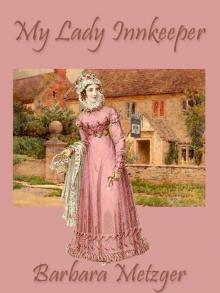 My Lady Innkeeper
My Lady Innkeeper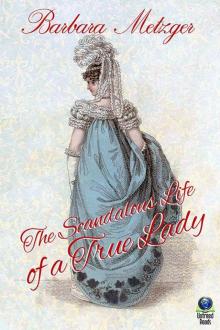 The Scandalous Life of a True Lady
The Scandalous Life of a True Lady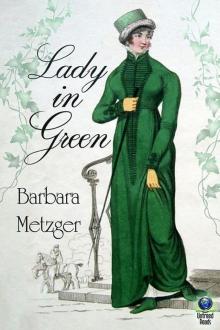 Lady in Green
Lady in Green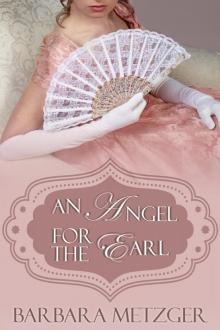 An Angel for the Earl
An Angel for the Earl Truly Yours
Truly Yours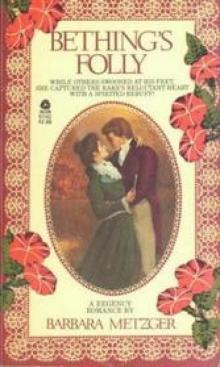 Bething's Folly
Bething's Folly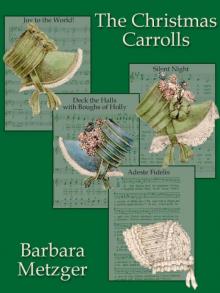 The Christmas Carrolls
The Christmas Carrolls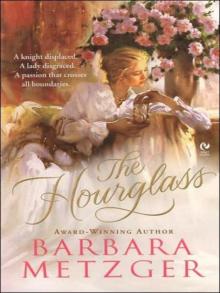 The Hourglass
The Hourglass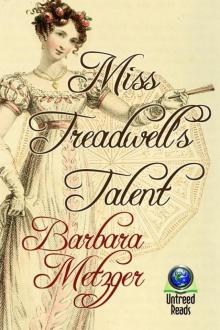 Miss Treadwell's Talent
Miss Treadwell's Talent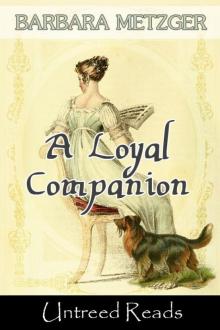 A Loyal Companion
A Loyal Companion Love, Louisa
Love, Louisa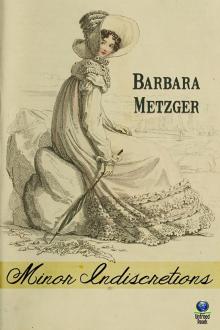 Minor Indiscretions
Minor Indiscretions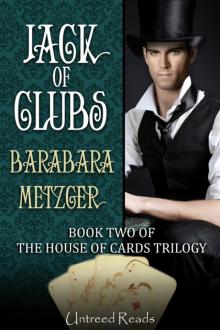 Jack of Clubs
Jack of Clubs An Enchanted Christmas
An Enchanted Christmas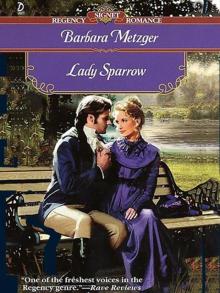 Lady Sparrow
Lady Sparrow Miss Westlake's Windfall
Miss Westlake's Windfall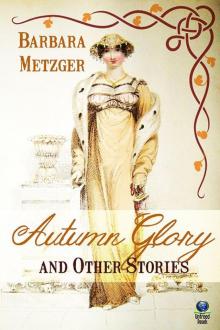 Autumn Glory and Other Stories
Autumn Glory and Other Stories Greetings of the Season and Other Stories
Greetings of the Season and Other Stories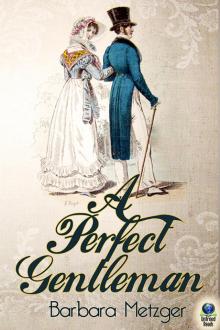 A Perfect Gentleman
A Perfect Gentleman